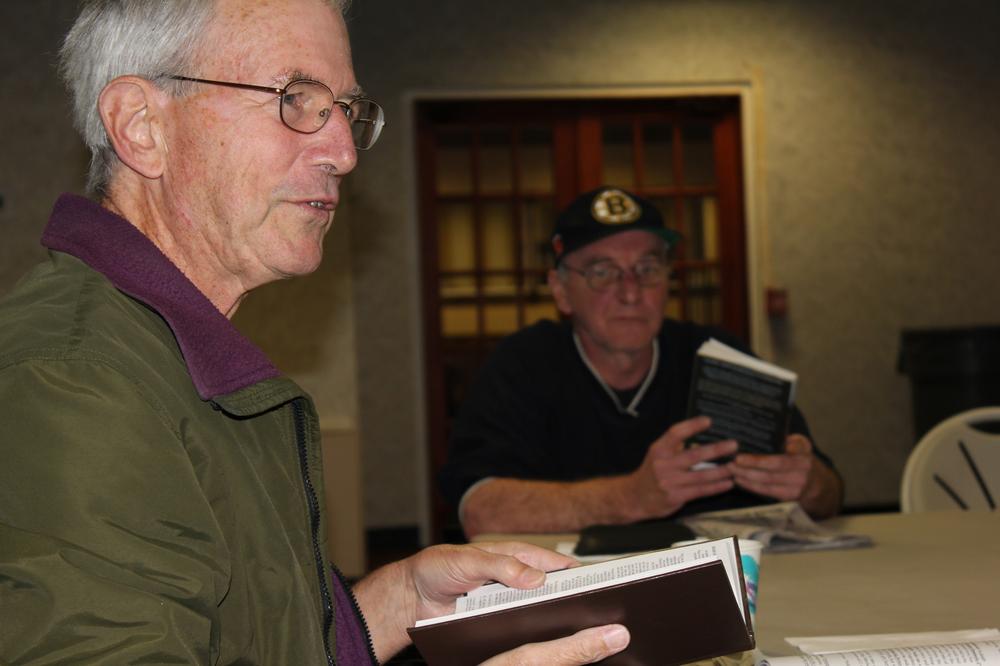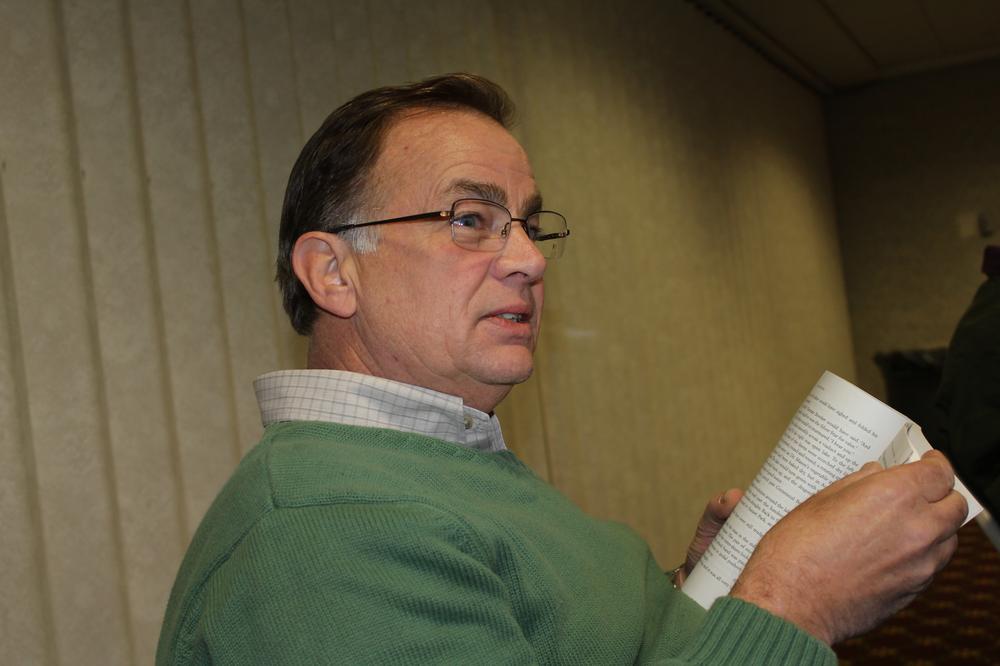Advertisement
A Book Club Whose Best Stories Aren't Written Down
Resume
Imagine for a moment that you're a high-powered attorney at a big law firm downtown.
Every morning, you walk through Boston Common on your way to work from your home in Back Bay. And every morning, you pass the same two homeless men who spend their nights in the park. If you're like most people, you just keep walking. But what might happen if you stop?
Peter Resnik is that high-powered attorney. "One day I commented on the fact that one of the men was wearing a Giants jacket," Resnik recalls. "And I was teasing him about it and he responded, 'It's not a Giants jackets, it's a warm jacket,' and where he bought his clothes, they didn't have Patriots jackets."
Resnik works for the global firm McDermott Will & Emery. After that day, when he stopped to talk to Chris, the man in the Giants jacket, Resnik found that his interactions with the two men became a little more personal. Pretty soon, Resnik and Chris' friend, Rob, discovered a shared interest — literature.
"I gave Rob a book called 'Water for Elephants,' which we would talk about on the way to work," Resnik says. "And then we started on another book and I asked him what he had done with 'Water for Elephants' and he had given it to somebody else on the Common. And I asked what they did it with it and they gave it to somebody else."

Resnik had suddenly discovered a group of people in the park who before had been invisible to him. "So I became aware that there were people who were reading books on the Common, Rob and I were enjoying the experience of talking about the books," he says, "and we decided we would try to see if we could put together a book club."
A book club for homeless people. At first, Resnik imagined they would hold meetings outside on the Common. But Rob pointed out that for a group of people who live outside, a nice warm place to meet inside would be a great comfort.
But when Resnik offered to provide lunch at the meetings, Rob said no.
"I told him, you know, you make sandwiches and everything, you'll get people coming in for sandwiches but not for the actual group," Rob recalls. "Let's just keep it simple — coffee and donuts — and those who are interested in actually reading will be the ones who come and not just anybody saying, 'Oh, there's free food here.' "
They found a nearby church, the Church on the Hill, that was willing to let them use the space once a week. And they teamed up with Ron Tibbets, an outreach worker in Boston who was leading a spiritual group for homeless people. Once Tibbets got over his initial reaction — "A book club?" he remembers asking, "in my mind it made absolutely no sense" — the members of his group became the club's core.
It was an interesting experiment. But still, nobody really knew how it would turn out.
Flash forward two years, to a recent Tuesday morning in an upstairs room at the Church on the Hill.
Ten book club members are seated around a long table, discussing a chapter of Tim O'Brien's "The Things They Carried," a fictional account of a platoon of American soldiers in the Vietnam War.
[sidebar title="Book Club Reading List" width="320" align="right"]
- "Water For Elephants" by Sara Gruen
- "All Souls" by Michael Patrick MacDonald
- "Angela's Ashes" by Frank McCourt
- "A Monk Swimming" by Malachy McCourt
- "A Thousand Splendid Suns" by Khaled Hosseini
- Selected short stories by O. Henry
- "The Samurai's Garden" by Gail Tsukiyama
- "Eye Contact" by Cammie McGovern
- "The Tempest's Roar" by R.A.R Clouston
- "Easter Rising" by Michael Patrick MacDonald
- "The Help" by Kathryn Stockett
- "The Glass Castle" by Jeannette Walls
- "Street Soldier" by Edward MacKenzie Jr.
- "Another Bullshit Night In Suck City" by Nick Flynn
- "Puddn'head Wilson" by Mark Twain
- Selected essays by Ralph Waldo Emerson
- "Nineteen Eighty-Four" by George Orwell
- "Three Cups Of Tea" by Greg Mortensen
- "Still Blinking" by Mark Krahling
- "The Things They Carried" by Tim O'Brien [/sidebar]
Several members are debating a chapter, "Sweetheart of the Song Tra Bong,” in which a soldier flies his childhood girlfriend in from Cleveland Heights to Vietnam, where she quickly becomes part of the wild jungle. The club members are divided over whether they are meant to believe the story or if O'Brien used the girl as a metaphor.
Tibbets steers the debate in a more personal direction. "Is O'Brien trying to talk to us about addiction?" he asks the group. "On page 109, when he talks about the wanting turns to craving."
There's quiet for several seconds.
"You know, I look at it as she has a need," one of the club members says. "And it becomes so intense that she has to have it, constantly." He pauses. "I mean, I don't want to get too far into it because of my own needs ... "
Tibbets breaks in. "But you can understand it."
"I can understand it," the club member says. "Yeah."
It is common, Tibbets says, for the conversations in the book club to turn to the real life experiences of members. They have read about two dozen books together now, ranging from Emerson essays to O. Henry short stories. But the books are secondary, Tibbets says. What's so important about the club, he says, is that its members finally feel like someone cares what they think.
"The one thing that institutional services for people who are homeless and marginalized don’t provide is a vehicle for them to feel better about themselves, to feel worthy of asking for help," Tibbets says. "Small groups where they are listened to, where their voice is heard, where they are heard, reinforce that sense of self-worth and value. And that’s what’s at the core of the book club."
For Resnik, the book club has been eye opening. "It’s very easy, as I did for many years, walking through the Common and kind of dehumanizing what is obviously the pain that people are going through, and the isolation that people are going through, and not dealing with it," he says. "And you saw through the book club that when you saw people as thinking, feeling human beings, nice people, people you could have as friends, it becomes a lot harder to walk by them in the Common."
But he insists he's just another member of the club — "including if I say something that somebody disagrees with, they have no hesitation about jumping all over me on it," he laughs. And Resnik says there is no discomfort at the end of meetings, knowing he's going back to a life far different than that of the other members.
"I just look forward to the next time I'm going to come back," he says.
Resnik has to come back if he wants to talk to his friend Rob. They don't see each other every morning on the Common anymore. That's because, with some legal help from Resnik, Rob is now living in housing. But he still comes to the book club every Tuesday.
This program aired on November 25, 2010.